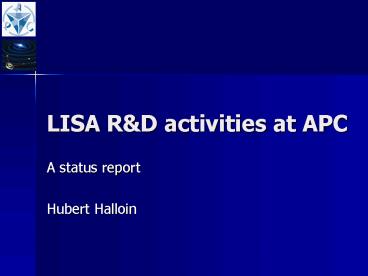LISA R PowerPoint PPT Presentation
1 / 14
Title: LISA R
1
LISA RD activities at APC
- A status report
- Hubert Halloin
2
RD activities at APC
- Recent implication of APC in the LISA RD ( 1.5
year) - LISA Pathfinder (Laser Modulator)
- Validation of test procedures (? Contraves)
- Acquire experience for further experiments
- LISA
- Laser stabilization
- Realization of a LISA-representative laboratory
3
The LISA team _at_ APC
- M. Abbès (electronics engineer)
- G. Auger (director of research)
- P. Binetruy (professor, director of the APC)
- H. Halloin (assistant professor)
- O. Jeannin (optical engineer)
- A. Petiteau (PhD student)
- E. Plagnol (director of research)
- P. Prat (electronics engineer, NPM for LISA
Pathfinder) - E. de Vismes (electronics engineer)
4
LISA Optical Test Equipment
- Centered on the interferometric signal
reconstruction (excluding inertial masses) - LISA-representative test bench
- What optical devices / electronics for the best
signal extraction ? - Characterization of present techniques (laser,
phasemeters, ) - Test facility for LISA instrumental developments.
- Conformation to / interaction with LISA
simulation - Realistic performance of signal reconstruction
algorithms (TDI,) - Supported by the French Space Agency (CNES)
- In collaboration with
- A. Brillet (O.C.A) Laser stabilization for
Virgo - SYRTE RD in time/frequency standards and
references
5
Development roadmap
- 3 major steps
- Laser stabilization and characterization
- Definition and development of a dedicated
phasemeter - LISA test bench (3 lasers, variable propagation
delays, realistic phasemeters,)
Short term 1 year
Long term 5 years
6
Laser stabilization
- Selected technique saturated absorption on
molecular iodine - Absolute reference (no long term drift, easier
arm-locking ?). - Already tested and promising for LISA
successful experiments at Observatoire de la Côte
dAzur (Nice, France) and GSFC. - Financial support from the French space agency
(CNES) - Collaboration with the OCA/ARTEMIS (A. Brillet)
and the SYRTE - Ways of improvements
- Better thermal, mechanical and electronics
stability - Improved feedback loop
- Low pressure enclosure
- Possible use of low pressure, non-saturated I2
cells at 0C, in collaboration with the BIPM
(better thermal stability) - Main technical and performance concerns
- Overall frequency stability
- Thermal and vibration control
- Wave front quality of the IR beam after frequency
doubling - I2 reactivity (in case of non saturated cells)
7
Laser stabilization foreseen design
- Current status
- Electronic cards development / realizations
- Precise mechanical and optical design
- Mounting to begin in Feb 2007
8
LISA in the lab
- Representative reconstruction of the
interferometric signal - Noise propagation delay (16 s !)
- Spectral perturbations (Doppler, Sagnac, etc.)
- GW simulation ?
- Reconstruction algorithm(s) (TDI) effective
performance, comparison with numerical
simulations. - Facility for methods and equipments tests
- Phasemeters
- USO
- TDI ranging
- Arm locking
in the lab
LISA
9
Simulating the propagation delays
Measurements
Doppler 10-6 Hz
LF laser phase noise lt1 Hz
HF laser phase noise gt1 Hz (not of interest )
- Global idea
- only the relative LF (lt1Hz) phase noise
frequency shift has to be propagated - No need to delay the full phase data (i.e.
carrier phase noise) - Small information content (low frequency) ? can
be easily digitally delayed
10
LISA in the lab
- 1st step phase locking the lasers
- Master laser reference noise
- Null relative phase noise (modulo frequency
offsets) - Of the shelf efficient techniques
11
LISA in the lab first idea
May be laser 1, 2 or 3 Iodine stabilized
Master laser
Phase locking
Laser 1
Phase locking
Laser 2 locking
?
Laser 3locking
12
LISA in the lab
- 1st step phase locking the lasers
- Master laser reference noise
- Null relative phase noise (modulo frequency
offsets) - Of the shelf efficient techniques
- 2nd step noise delays simulation
- Use of AOM (frequency shifts)
- Low frequency noise can be easily digitally
delayed - Possibility to simulate 1 year of data (Doppler,
laser noise, GW ?) within hours
13
LISA in the lab first idea
Master laser
Phase locking
Laser 1
AOM
Phase locking
Laser 2 locking
?
Laser 3locking
L1 delayed
Digital delays
L1 local
LF noise generator (statistically.
representative) FM ? Doppler shift PM ? LF phase
noise
AOM
?12?16s
Simulated delays of noise
AOM
?13?16s
?
?
?
- Principle design, to be precised
- Continuity of precedent work (stabilization,
?-meter) RD (locking, delays) - Planned for 2008
?
L2 local
L3 local
L2 delayed
L3 delayed
14
Conclusions
- Continuation of LISA Pathfinder activities
- RD on iodine stabilization
- Optical and electronics design started
- Mounting to begin within a few weeks (on our new
site ) - Strong support of the French space agency (CNES)
- Collaboration with
- OCA / Artemis (A. Brillet)
- SYRTE

